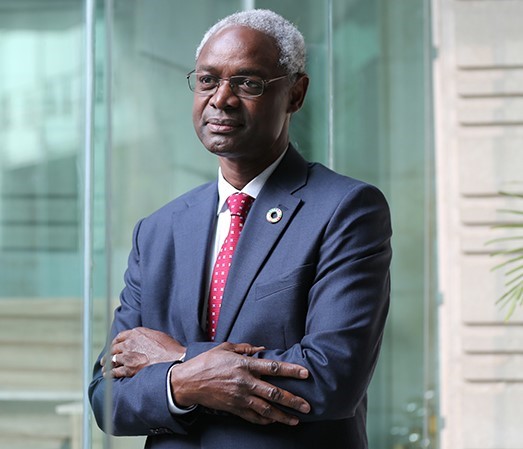United Nations Secretary: ‘We Need Private Sector Engagement, Investment to Solve Environmental Crises’

Ibrahim Thiaw, Executive Secretary of the United Nations Convention to Combat Desertification, on climate change, biodiversity and productive land loss requiring immediate action, featured in exclusive interview with ‘VISION by Protiviti’
In an interview with VISION, the United Nations’ (UN) Executive Secretary of the UN Convention to Combat Desertification calls on global business leaders to take an active role in helping to solve the planet’s biggest problems. “Businesses need to shift from a linear economy — extracting resources, using them quickly and discarding them as waste — to a circular economy where used products are repurposed and re-injected in the economy,” said Ibrahim Thiaw in an interview with global consulting firm Protiviti while he was at COP27, the Conference of the Parties to the United Nations Framework Convention on Climate Change.
“Business has a huge role to play in shaping the consumption patterns of the growing middle class, as it will demand more land, water and other resources. There is a dire need for investments that, at once, match this huge consumer demand for change, and ensure we adapt to the multiple disruptions exacerbated by climate change and land degradation,” stated Thiaw.
See related articles: SDG Ambition: Mobilizing Ambitious Corporate Actions Towards the Global Goals, Reducing Inequalities to Advance Human Rights: The Role of Business, Accelerating Private Sector Action for a Just Transition to Net Zero
The interview, conducted by Protiviti’s Baris Karapinar, ESG and Sustainability lead for the firm’s operation in Switzerland, wrapped up Protiviti’s six-month exploration of the business impact of sustainability in a content series titled “Future of ESG,” the latest theme explored on the VISION by Protiviti online thought leadership platform.
Thiaw calls on the private sector to help solve Earth’s environmental challenges, including climate change, drought, water scarcity, land degradation and biodiversity loss. Doing so will give people a chance to generate 50 percent more wealth over the next three decades, Thiaw says. “The world has a choice: Either we continue with the current nature-destructive path and lose up to half of the global GDP by 2050, or we take a sustainable land management approach to combat the current environmental crises we’re facing.”
The UN has led the global effort to raise awareness and affect action with its Sustainable Development Goals, a call for action by all countries — poor, rich and middle-income — to promote prosperity while protecting the planet. “The global economy will lose an estimated US$23 trillion by 2050 through land and soil loss alone if we continue with business as usual,” Thiaw said.
The economic returns of restoring land and reducing degradation, greenhouse gas emissions and biodiversity loss are estimated at US$140 trillion every year. That’s about 1.5 times the global GDP of $93 trillion in 2021, according to the UN. “This is an investment opportunity, not a threat to business,” Thiaw said. Perhaps business could shift to a more ‘nature-positive’ business model, where the ultimate objective goes beyond the traditional bottom line of a company to embracing ‘doing good,’ as well, he added. “The possibilities for business to drive change are unlimited. The choice is ours.”
Cory Gunderson, executive vice president, Global Solutions, Protiviti, says the United Nations’ message couldn’t be clearer. “Business leaders will play a critical role in helping solve some of the planet’s biggest challenges. There are many paths to explore. We believe having clear strategic goals and objectives to address ESG matters is a key to future success. And it can be good business. We’re thrilled to highlight the key issues facing businesses, including ESG, in our landmark VISION by Protiviti program,” said Gunderson.
The interview with Thiaw is one of more than 30 pieces of content, including videos, podcasts and articles, currently available as part of VISION by Protiviti‘s Future of ESG initiative available here.
Source: Protiviti








